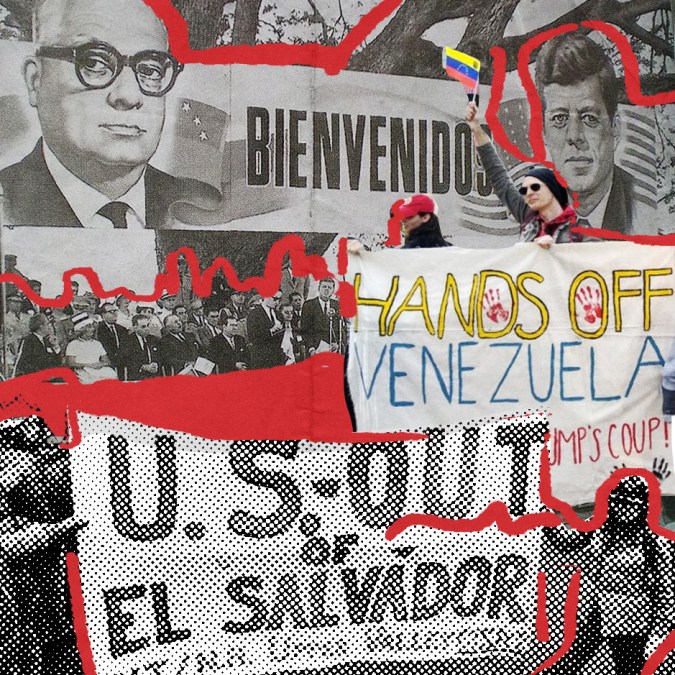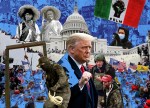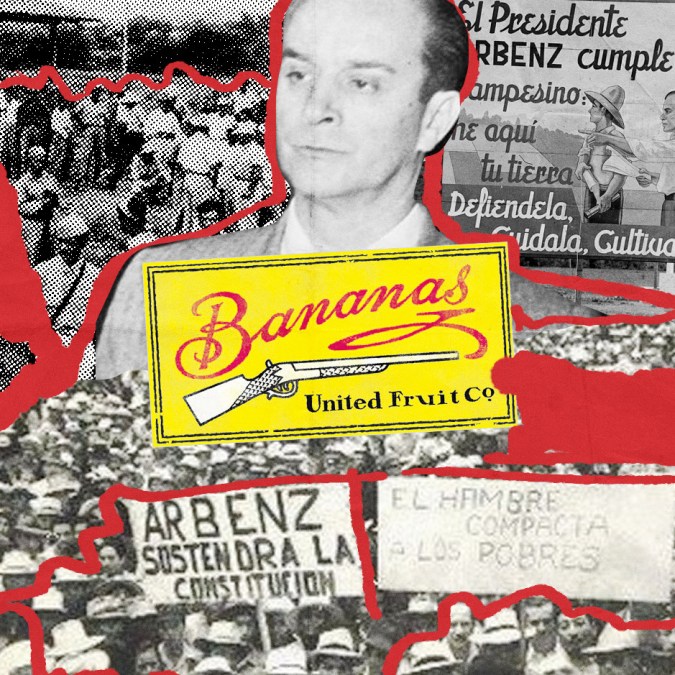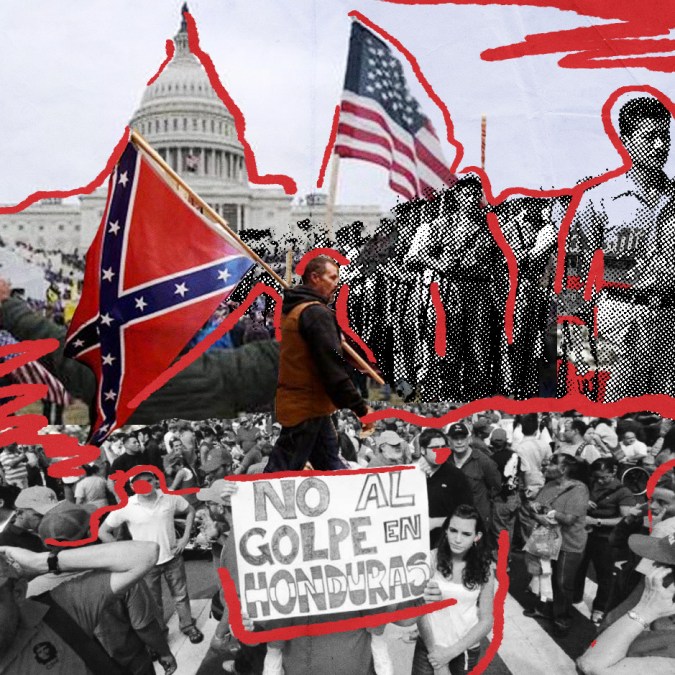As reactions from politicians and others poured in after Wednesday’s pro-Trump, white supremacist attempted coup at the U.S. Capitol, there was a theme that arose: insulting references to the political turmoil of countries in the Global South as a means of trying to contextualize the chaos that erupted in Washington.
An emblematic example of that was when, on Wednesday, former President George W. Bush said, “This is how election results are disputed in a banana republic not our democratic republic,” in reference to the racist, imperialist term describing politically unstable “third world” countries. Meanwhile, CNN anchor Jack Tapper said he felt he was talking to a correspondent “from, you know, Bogotá,” when speaking to CNN’s Manu Raju while processing the incident live on air.
The issues in most of our countries are a direct result of U.S. intervention and colonialism.
This isn’t the first time this goes down. Estadounidenses, white liberals and conservatives alike, often use the violence and corruption in our countries as sensationalist comparisons to political issues faced on U.S. soil. They refer to countries like Colombia, Haiti or Guatemala as “lawless” nations, implying that chaos is somehow a cultural or genetic trait of our communities—an approach that blatantly disregards the fact that the political and economic issues in most of those countries are a direct result of U.S. intervention and colonialism.

It’s largely unacknowledged that the U.S. has its own issues with political corruption and instability, and that this kind of white supremacist violence has been inflicted on Black and Native communities since the country’s inception. This fractured and ignorant analysis also erases the longstanding legacy of the U.S. in fueling brutal right-wing, military coups, and subsequently political instability, in the very dozens of countries it now mocks.

U.S. imperialism, and centuries of colonialism before then, turned our motherlands into “banana republics,” a term that was first used by American author O. Henry in the early 1900s to describe Honduras and other countries in the region being economically exploited by U.S. corporations such as the United Fruit Company.
It’s genocide, justified by the so-called preservation of democracy.
In Guatemala, the 1954 U.S.-backed coup of democratically elected president Jacobo Árbenz was followed by a U.S.-backed war that led to the death of over 200,000 mostly Indigenous people. It was a genocide justified by the anti-communist fearmongering of the Cold War era, and the so-called preservation of democracy.
Árbenz was overthrown over discontent for many of his policies, which were perceived as radical, including an agrarian reform that redistributed land to Indigenous people and campesinxs. The move was in direct opposition to the interests and monopoly of the United Fruit Company—a mega-corporation that then lobbied the U.S. government to overthrow Árbenz. The aftermath of that coup unleashed a war in Guatemala that lasted for nearly four decades, from 1960 to 1996. Former president Ronald Reagan clearly stated the role of U.S. intervention in Central America in an infamous 1984 speech. “Central America is a region of great importance to the United States. And it is so close: San Salvador is closer to Houston, Texas, than Houston is to Washington, DC. Central America is America. It’s at our doorstep,” he said.
That being said, what happened in D.C. this week will never amount to the bloodshed our countries have endured during and after U.S.-backed coups. Intervention in Guatemala, and the Central American region, specifically, has been ongoing, and the consequences are palpable in many ways, including the thousands of refugee families fleeing to the U.S. every year.

The argument that the white supremacist attacks that took place are not representative of American values or that this country’s position as a “beacon of democracy” in the world has suddenly been tainted is untrue. To most of the rest of the world, this is absolutely on brand. For decades, the U.S. has preserved its economic and political interests at the expense of millions dying or being displaced. To so many of us, the U.S. government has never been a beacon of democracy but rather a beacon of destruction.
The scenes we witnessed at the U.S. Capitol are painfully familiar across multiple generations of Central and South Americans, communities in the Caribbean, the Middle East, and many others whose motherlands have been dismantled by U.S. intervention and foreign policy. Whether it’s the coup against democratically-elected Chilean President Salvador Allende in 1973, the coup against democratically-elected Iranian Prime Minister Mohammad Mosaddegh in 1953, the 2004 coup against democratically-elected Haitian President Jean-Bertrand Aristide or the 2009 coup of democratically-elected Honduran President Manuel Zelaya, the list feels endless.

In the past, the U.S. government has meddled in plenty of Latin American elections and supported fraudulent, unelected “presidents,” such as Venezuelan opposition leader Juan Guaidó and Bolivia’s right-wing former interim president Jeanine Áñez, who rose to power just over a year ago, after a U.S.-backed coup overthrew Bolivian President Evo Morales.
Many claimed there had been fraud in Morales’s 2019 re-election, but no evidence was found. Fascists, too, stormed government buildings, unleashing terror with bibles in hand. Morales triumphantly returned to Bolivia this past November as his political party Movimiento Al Socialismo (MAS) returned to power with the landslide election of President Luis Arce. This felt like a true restoration of democracy that not many of our countries have ever been able to savor.
It feels like a choice to ignore the communities who’ve been screaming these facts for decades.
Election fraud only feels legitimate when it favors a candidate supported by the U.S. as was the case in 2017 in Honduras when massive protests erupted over widespread allegations of fraud against the re-election of U.S. ally President Juan Orlando Hernández.
To a lot of us, it was indignant to watch the privileged shock of some U.S. Americans at what right-wing political violence looks like. But the mob at the Capitol was merely replicating the same kind of terror U.S.-trained mercenaries or death squads have carried out in foreign countries. Except, the consequences of these acts in our motherlands are far more painful and deeply-rooted. For many, that ignorance may be the result of a history that’s taught through the lens of American exceptionalism. After a while, however, it feels like a choice to ignore the communities who’ve been screaming these facts for decades. Then, of course, there’s the privileged denialism of the growing white supremacist violence that’s plagued the U.S. long before, and throughout President Trump’s reign. Black and Native grassroots organizers long warned us this would happen.




